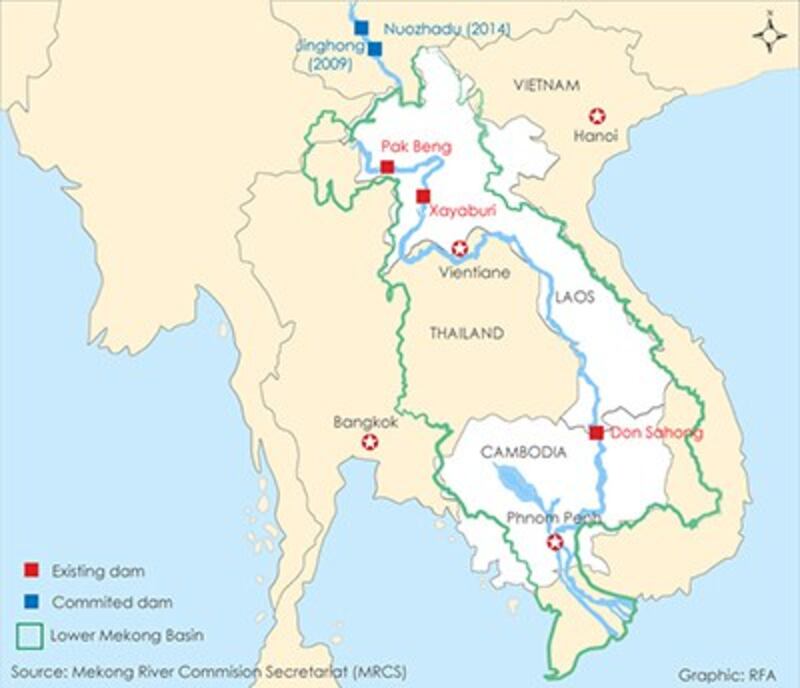A group of NGOs on Thursday reiterated demands that the Lao government delay construction of the controversial Pak Beng dam on the Mekong River’s mainstream, days after an intergovernmental body called on Vientiane to address the project’s potential transboundary impacts.
On June 19, the Mekong River Commission (MRC)—an intergovernmental body made up of Thailand, Cambodia, Laos, and Vietnam that supervises development along Southeast Asia’s main waterway—held a special session of its Joint Committee on the Pak Beng dam in Laos’ Oudomxay province to mark the sixth month of the project’s Prior Consultation process.
In a statement issued a day after the meeting in the Lao capital Vientiane, the Joint Committee said it had reviewed plans for the U.S. $2.4 billion-dam and called on the government of Laos to “make all reasonable efforts to address potential adverse transboundary impacts of the Pak Beng project.”
The committee suggested Laos consider addressing potential upstream and downstream impacts on hydrology and hydraulics, improving sediment transportation, refining upstream and downstream fish passage, and gaining a better understanding of potential socioeconomic transboundary impacts.
It also suggested that Laos put better measures in place to ensure freedom of navigation on the Mekong, establish a communication channel for providing input on the ongoing design and development of the project, and share improved designs and monitoring data for the dam.
On Thursday, executive director of the NGO Forum on Cambodia Tek Vannara went further and demanded that Laos halt construction on the 912-megawatt dam, which Vientiane notified the MRC of its intention to begin building in November last year.
He said that the Rivers Coalition in Cambodia (RCC), a group of Cambodian and international civil society groups representing communities affected by dams organized under the NGO Forum on Cambodia, remains firmly opposed to the Pak Beng, amid concerns the dam would harm the environment and lead to widespread relocation and loss of livelihoods.
“The common stance of the Rivers Coalition in Cambodia, following our discussion on the issue, is to urge the halt of the Pak Beng hydropower dam construction,” he told RFA’s Khmer Service.

Additional data
The demand echoed a response to the MRC statement by environmental watchdog International Rivers, calling on the Lao government and the commission to require further studies on the Pak Beng before allowing the project to proceed.
Speaking to RFA’s Lao Service following the MRC Joint Committee meeting, International Rivers’ Southeast Asia director Maureen Harris said data provided by the dam’s developer was out of date and incomplete.
“The Lao government and the MRC should require the developer to go back and do further studies, including collecting baseline information on key issues around fisheries, sediment, and hydrology; updating the data they’ve used in their studies which, in some cases, is nearly 10 years old; and conducting proper transboundary impact assessments, which includes consultations with affected communities in neighboring countries,” she said.
“The Lao government, as well as other regional governments, should request this from the project developer before any decision is made to go ahead with the project and before allowing any agreement to be signed between stakeholders involved in the project.”
Earlier this month, representatives of Cambodia’s communities on the country’s Ton Le Sap lake and along the Mekong River, as well as from youth movement groups and civil society organizations, urged Phnom Penh to pressure Vientiane to shelf the Pak Beng project amid concerns over its potential impact on fish resources.
In response to calls for pressure on the government of Laos, Cambodia’s Ministry of Environment spokesperson Sao Sopheap told RFA that Phnom Penh has repeatedly requested that Vientiane “ensure proper and comprehensive studies on environmental impact assessment.”
But he stopped short of suggesting that Cambodia’s government would demand an end to the project and referred questions to the MRC about how Phnom Penh would react to any new findings on the dam’s potential impacts.
Te Navuth, secretary-general of the Cambodia National Mekong Committee, was not immediately available for comment on Thursday.
Dam-building spree
The Pak Beng dam is expected to cost around U.S. $2.4 billion to build and five years to complete. When finished, the dam will become the third large-scale project built by Laos on the Mekong, after the Xayaburi and Don Sahong dams.
International Rivers cites estimates that 6,700 people will have to be relocated to build the Pak Beng, with 25 villages in Laos and two in Thailand directly affected, while impacts to the flow of the Mekong could affect the livelihoods of millions of people living downstream from the project.
Lao officials have said that only 1,000 people in Laos will be impacted by the dam, promising to compensate them and build new infrastructure and services for the villages they are relocated to.
The Pak Beng is the northernmost in a proposed cascade of eleven dams on the Mekong River’s mainstream. Laos and other Asian nations have been on a dam-building spree as they try to harness the power of the Mekong and other rivers.
While the Lao government sees power generation as a way to bootstrap the country’s economy, the projects are still controversial for their environmental impact and their financial arrangements.
Reported by Savi Khorn and Moniroth Morm for RFA’s Khmer Service and by RFA’s Lao Service. Translated by Sovannarith Keo. Written in English by Joshua Lipes.
